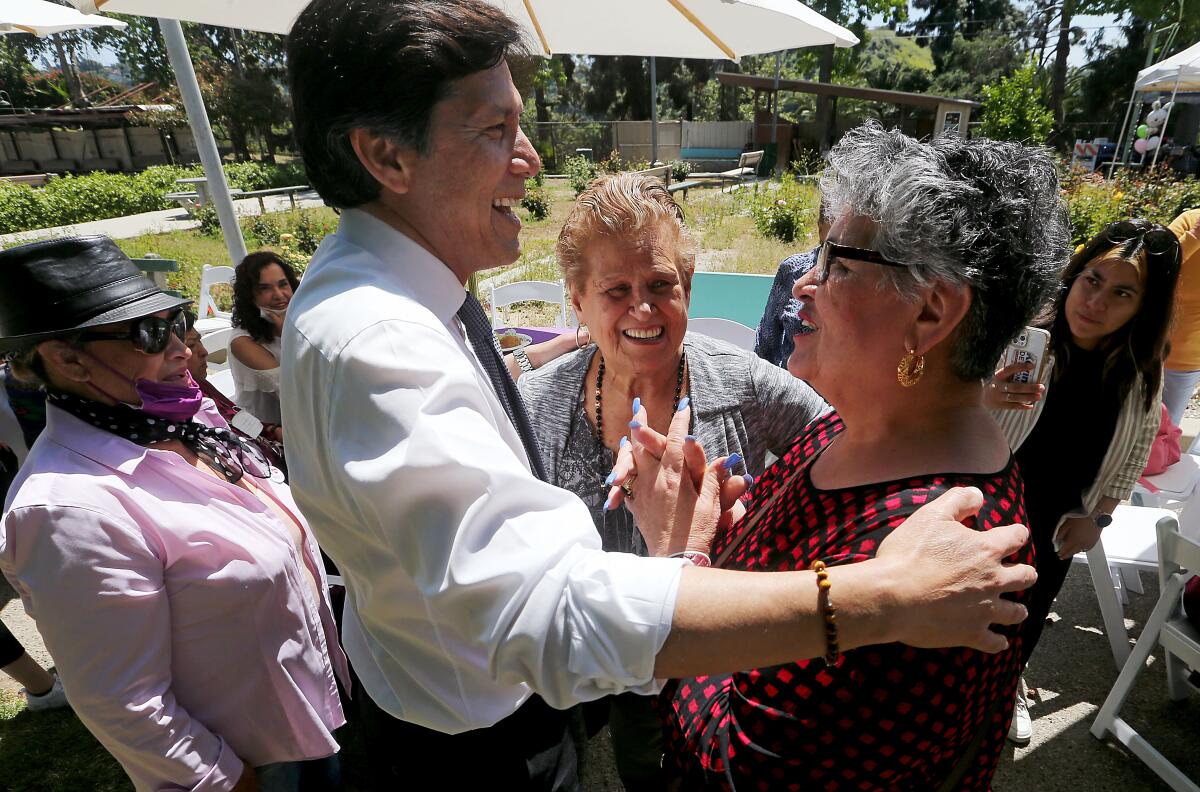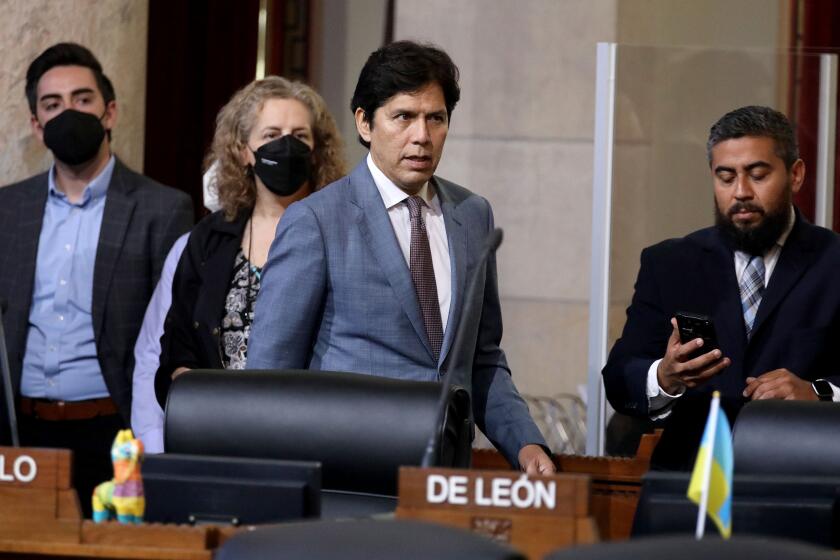Column: Kevin De León’s recall failed. Does he have a comeback path?

- Share via
Kevin De León is still a pariah in the halls of power in Los Angeles, but that status may not necessarily be permanent.
His predicament came when leaked audio exposed him and other Latino councilmembers in a conversation about redistricting that contained racist and divisive remarks. He refused to resign despite deafening calls for him to step down. Now, he might have a path to re-election in 2024.
An effort to recall him recently failed to gather enough signatures, though that’s not a surprise given the high bar and the fact that most recall attempts fail. Still, the recall news raises questions about his future. Did those predicting the death of De León’s political career miss something?
Opinion Columnist
Jean Guerrero
Jean Guerrero is the author, most recently, of “Hatemonger: Stephen Miller, Donald Trump and the White Nationalist Agenda.”
A Los Angeles Times poll in January showed that while 51% of voters in his district wanted him to resign, that figure was lower for Latino voters at 43%. Sixty-four percent of white voters in his district wanted him to go.
Some of his Latino constituents have told me they believe his record of good deeds outweighs the ugliness of his remarks and silences in the closed-door conversation, which included him comparing a Black child to a luxury accessory and worse comments from others.
In recent days, many Black leaders have spoken out in support of former City Councilman Mark Ridley-Thomas, who was found guilty of federal corruption charges. Many noted the importance of Ridley-Thomas’ record of accomplishment. After the verdict, Mayor Karen Bass called it a “sad day for Los Angeles,” adding that she feels sad “personally.” The contrast to De León’s treatment is stark.
De León, who didn’t commit a crime, hasn’t had many Latino leaders defending him. There’s been condemnation from leaders of all backgrounds and he’s been called a “violent racist.”
Are the council member’s detractors neglecting his record, his current work and his future value? Only his constituents’ assessment of that matters.
De León complained about Black political power on the tape and aggravated the city’s racial tensions by refusing to resign. There’s no doubt that in private, he’s guilty of Latino grievance politics. But in a world where Latinos remain severely underrepresented in politics, does that make him racist?
“Go back and look at my record,” De León told me in a phone conversation on Wednesday. “That is my reflection of who I am. Those are my values. Those are my principles.”
Good deeds don’t cancel out misdeeds, as some say of Ridley-Thomas. But should De León’s deeds be weighed against his words?
De León prevented more deportations than perhaps any other politician, sponsoring a bill that made California a sanctuary state. For a time, he was heralded as the top warrior of the Trump resistance.
That doesn’t mean he deserves to stay on the City Council. But I do wonder if the speed with which many leaders demanded his resignation says as much about bipartisan apathy toward the issues he championed as it does about his failings.
Sure, he’s got a chip on his shoulder. He exhibits flashes of narcissism. Labor icon Dolores Huerta has called him a “bully.” But it’s also true that he has fought more boldly than anybody for undocumented people.
He fights for others, too. He has often endorsed or appointed Black leaders over Latinos. On the state Legislature, he co-led a bill to apologize for crimes against Chinese immigrants. He played a key role in narrowing the racial gap in retirement savings, authoring the first state retirement savings bill and inspiring others. He wrote the bill to make power companies in California carbon-free by 2045, making him “an unsung hero” of the clean-energy movement. He’s been recognized as a leader on women’s rights, sponsoring a historic bill to require state colleges and universities to address sexual violence on campuses.
But few remember those accomplishments. And because of the leaked audio, he may have lost his ability to build multiracial coalitions.
“The language he used was so hurtful, that I don’t think he’s the best person to lead any movement forward,” Rolando Cruz, a Boyle Heights resident, told me. “If he was just going to focus on Latino causes, for sure, but that’s just not the society we live in anymore.”
It’s De León’s Achilles’ heel: Although his policies benefit people of all backgrounds, he views himself as an embattled leader who represents, above all, Latinos. An ad called “Our Time” from his failed 2018 race against Sen. Dianne Feinstein exposes this vision. It attacks Feinstein and Trump for bashing immigrants and has a scene of a single mother, a housekeeper like De León’s mom, taken away by immigration agents. “This is our story,” De León says. “It’s time to stand up and fight back.”
He’s speaking to Latinos, with an urgency that is deeply understood by people from mixed-status families. Although all Americans benefit from undocumented people’s labor, few consider them a priority. Fairly or not, this may have limited his appeal.
The next opportunity to unseat De León will be in 2024. Assemblyman Miguel Santiago (D-Los Angeles) announced Friday that he was challenging him.
In the meantime, some leaders say De León shouldn’t be sidelined. “It’s time to heal, it’s time to remember that at the end of the day, we are all humans and we all make mistakes and he did not commit any criminal act,” Lydia Camarillo, president of the Southwest Voter Registration Project, told me.
His critics see the failed recall as a lesson. Cruz, the Boyle Heights resident, compared De León to an older boxer, using craftiness to outmaneuver stronger, younger fighters. While critics yelled and cursed, De León helped struggling elders in the district, scoring sympathy.
Cruz believes activists should replicate the energy of the march that the Oaxacan community led in October after the scandal broke. That show of unity was powerful, he said, because it was “a celebration of community, of the city, of being from the city — an opportunity to bring people together.”
Indigenous leaders were among the many who demanded that De León resign. It may be that the most effective way to unseat him will be to rise above the grievance politics he represents and lead with goodwill.
More to Read
A cure for the common opinion
Get thought-provoking perspectives with our weekly newsletter.
You may occasionally receive promotional content from the Los Angeles Times.













